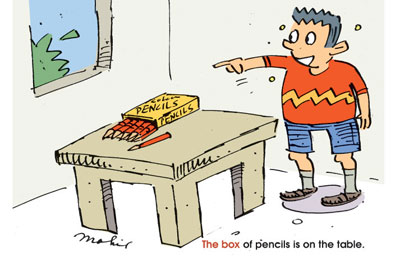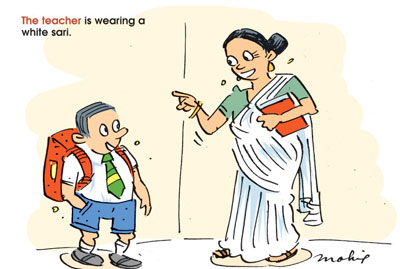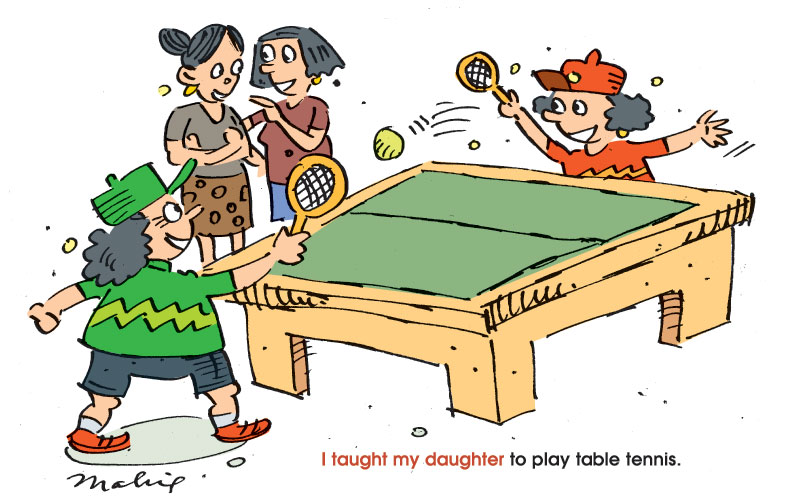|

by R. S. Karunaratne
Subject - verb agreement in positive statements
Every sentence has a subject. It can be a noun, pronoun or a noun
phrase. Similarly, every sentence has a verb. We decide whether to use a
singular or plural verb by looking at the subject. For instance, if the
subject is singular the verb too has to be singular. If the subject is
plural, the verb too should be plural.
History is an interesting subject.
Nimal walks to school everyday.

The teacher is wearing a white sari.
We prefer to travel by train.
Nayanthara writes long essays.
When the subject is a noun phrase we look at the headword to decide
whether to use a singular or plural verb.
The box of pencils is on the table.
The boxes of chocolates are in the cupboard.
The group of dancers want to perform in Colombo.
A chain of mountains divides the country into two parts.
A bottle of milk sells at Rs 50.
When two subjects are joined by ‘either...or’, we use a singular verb
when both subjects are singular.
Either Herat or Manel has taken my pen.
Either Sara or Judith knows the answer.
Either Ben or John wants a lift.
Either Sama or Nethmi works diligently.
Either Lucky or Perera is in the class.
If one subject is singular and the other is plural, the verb agrees
with the subject that is closer to it.
Either the boys or the girls are making a loud noise.
Either the teacher or the students are in the classroom.
Either the players or their coach is at fault.
Either my son or my daughters are coming to see me today.
Either the dogs or the cat is hungry.
Uncountable nouns take singular verbs, even if they end in ‘s’.
The news is true.
Politics is a game for some people.
Billiards is a game I cannot play.
Measles is a viral disease.
Water has to be purified before drinking.
When the subject is a collective noun, we can use either a singular
verb or a plural verb. However, we use the singular verb when we speak
of the group as a single unit. We use a plural verb when we speak of the
group as a number of individuals.
The family is the smallest unit in society.
My family enjoy different hobbies.
The army has received reinforcements.
The office staff are planning to go on a trip.
The committee have promised to consider his request.

[Activity]
Underline the correct verbs in the brackets. Check your answers with
the key.
1. Economics (is / are) an interesting subject.
2. Computers (is / are) essential in modern offices.
3. The lazy boy (walk / walks) clumsily to school.
4. The author of these novels (is / are) a brilliant writer.
5. After a long journey the students (is / are) exhausted.
6. The vehicles put up for sale (are / is) very expensive.
7. No information (is / are) available on the missing boats.
8. Either the principal or the class teacher (know / knows) the answer.
9. Physics (is / are) not an easy subject.
10 The majority of students (want / wants) to go home early.
Key:
1. is 2. are 3. walks 4. is 5. are 6. are 7. is 8. knows 9. is 10.
want
Proverbially speaking...
A proverb is a popular short saying, with words of advice or warning.
It shows an important aspect of folk wisdom.
1. Don’t cry before you are hurt.
Misfortunes are bound to happen in life. However, you should not give
way to them till they actually happen. Sometimes, they may not happen at
all.
2. Don’t cry stinking fish.
Here the verb ‘cry’ means ‘to offer for sale.’ If you condemn your
own wares, nobody will buy them. By extension, do not belittle your own
efforts.
3. Don’t cut off your nose to spite your face.
Here the verb ‘to spite’ means ‘to be revenged upon’. Do not do
anything in a fit of temper because you will injure yourself.
4. Don’t cut the bough you are standing on.
Do not endanger your own position by taking hasty decisions. For
instance, do not leave your present job until you get a better one.
5. Don’t empty the baby out with the bath water.
While trying to achieve your ambition do not do anything that might
cancel your efforts. For instance, a person may burn all the
correspondence to forget the past. In the process he may destroy even
his educational certificates.
6. Do not halloo till you are out of the wood.
Here the verb ‘to halloo’ means ‘to give a loud exclamation.’ Before
an impending danger is really over, do not rejoice. For instance, do not
throw a party before the examinations results are out!
7. Don’t have too many irons in the fire.
If we try to do too many things at the same time, we may not do
anything properly.
8. Do not kick against the pricks.
Here a ‘prick’ means ‘an ox-goad, a spiked stick for urging cattle.’
In today’s context, it is futile to fight a losing battle by going
against authority.
9. Don’t make a mountain out of a molehill.
Do not make a big fun over a trivial matter.
10. Don’t make a rod for your own back.
Don’t do anything that may get you into trouble later on.
11. Don’t make yourself a mouse or the cat will eat you.
Always stand up for yourself. Otherwise others will take advantage of
you.
12. Don’t meet trouble halfway.
Do not worry about something before it happens. Sometimes, no
disaster will happen.
Starters:
Useful expressions in speech
“I want you / him / her / them to” is a useful expression in speech.
I want you to come with me.
I want him to clean the house.
I want her to wash all the clothes.
I want them to repair the damaged vehicle.
We form the negative in a similar way.
I don’t want you to get wet.

I don’t want him to leave the company.
I don’t want her to do all the household work.
I don’t want them to pay me compensation.
We use the same structure with certain other verbs.
I told him to be a little more polite.
Manel asked her friend to help her.
What do you advise me to do now?
She persuaded him to buy the new house.
I didn’t expect her to come home today.
I taught my daughter to play table tennis.
We do not use ‘to’ with verbs such as ‘make’ and ‘let.’
Sometimes, you make me laugh!
He made me a journalist.
Let him go now.
Let’s dance!
Let me stay at home.
[Activity]
Complete the following sentences with the given verbs. Sometimes, you
will need ‘to’ before the verb. Check your answers with the key.
Verbs: arrive, clean, cry, do, explain, go, get, hear, know, sleep
1. Now let him .................
2. The teacher knows how ......................... the grammatical
rules.
3. Father asked me ............... the house.
4. Let the baby ...................
5. Talk quietly. I don’t want others ................... what you say.
6. You’ve come very early. I expected you ................. later.
7. It’s a sad story. It made me ...................
8. Don’t tell anyone about my failure. Especially I don’t want my
parents ............ it.
9. After listening to him, I advised him ......................
professional help.
10. I came home early ........................ my homework.
Key:
1. go 2. to explain 3. to clean 4. sleep 5. to hear 6. to arrive 7.
cry 8. to know 9. to get 10. to do
Nouns and adjectives
Make adjectives from the following nouns and check your answers with
the key.
1. Adventure .......................
2. Angel .......................
3. Anxiety .......................
4. Athlete .......................
5. Book .......................
6. Brute .......................
7. Cat .......................
8. Disaster .......................
9. End ........................
10. Enemy ........................
11. Essence .......................
12. Face ........................
13. Fire .......................
14. Hero .......................
15. Line ........................
16. Money ........................
17. Nose ........................
18. Parent ........................
19. Picture .......................
20. Poison .......................
21. Palace .......................
22. Poetry .......................
23. Ignorance .......................
24. Muscle .......................
25. Sun ........................
-----------------
Key:
1. adventurous 2. angelic 3. anxious 4. athletic 5. bookish 6. brutal
7. cattish 8. disastrous 9. final 10. inimical 11. essential 12. facial
13. fiery 14. heroic 15. linear 16. monetary 17. nasal 18. parental 19.
picturesque20. poisonous 21. palatial 22. poetic 23. ignorant 24.
muscular 25. sunny
Common proverbs
Proverbs contain concentrated folk wisdom. Match the words in column
‘A’ with those in column ‘B’ to complete the common proverbs. Check your
answers with the key.
[Column A]
1. An apple a day
2. Absence makes
3. A thing of beauty
4. Blood is thicker
5. Everybody’s business
6. Let bygones
7. Boys will be
8. Birds of a feather
9. Old birds are
10. A bird in the hand
11. The early bird
12. Once bitten
13. New brooms
14. Every cloud has
15. God made the country;
16. You can’t eat your cake
17. Cleanliness is
18. Courtesy costs
19. Cut your coat
20. Do not count your chickens
[Column B]
A. than water.
B. be bygones.
C. according to your cloth.
D. before they are hatched.
E. flock together.
F. keeps the doctor away.
G. nothing.
H. man made the town.
I. not caught with chaff.
J. next to godliness.
K. is worth two in the bush.
L. twice shy.
M. a silver lining.
N. the heart grow fonder.
O. catches the worm.
P. and have it.
Q. is nobody’s business.
R. boys.
S. sweep well.
T. is a joy for ever.
Key:
1. F 2. N 3. T 4. A 5. Q 6. B 7. R 8. E 9. I 10. K 11. O 12. L 13. S
14. M 15. H 16. P 17. J 18. G 19. C 20. D |

